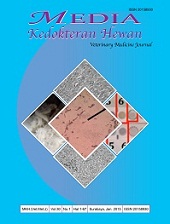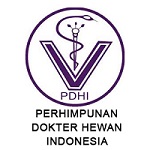Molecular Detection of Bacterial Pathogens in Flies as Potential Vectors from Surabaya Traditional Markets
Downloads
Flies are insects that act as mechanical vectors in the spread of disease, especially in environments with poor sanitation, such as traditional markets. Surabaya has several traditional markets with relatively poor hygiene, which poses a risk of becoming breeding grounds for flies carrying pathogens. This study aims to identify fly species and detect the presence of pathogenic bacteria, especially Escherichia coli and Salmonella spp., using the Polymerase Chain Reaction (PCR) method. This study employed purposive sampling and collected samples at five traditional market locations throughout the city of Surabaya. Morphological identification revealed that Musca domestica (89.78%) was the dominant species, followed by Chrysomya megacephala (9.43%), Chrysomya saffranea (0.3%), Lucilia sp. (0.41%), and Sarcophaga sp. (0.08%). The result of bacterial culture on selective media and PCR confirmation showed the presence of Escherichia coli (100%) in fly samples, while in SSA media, which was continued with biochemical tests, the results did not detect Salmonella (0%) bacteria. These findings confirm that market flies, particularly Musca domestica, can serve as vectors of pathogenic bacteria and have the potential to transmit diseases to humans. Therefore, monitoring and controlling fly populations in traditional markets is necessary as a preventive measure to maintain public health.
Attaullah, M., Ullah, F., Khan, I., Ilahi, I., Zahoor, M., Amin, M., Ullah, R., Ali, E.A., Jan, A., Bibi, S., 2024. Post Mortem Interval Calculation of Oryctolagus cuniculus through Forensic Entomofauna – A Tool for Resolving Medicolegal Issue in Crime Scenes. Sains Malaysiana, 53(6), pp.1255-1267. DOI: http://doi.org/10.17576/jsm-2024-5306-03
Bertelloni, F., Bresciani, F., Cagnoli, G., Scotti, B., Lazzerini, L., Marcucci, M., Colombani, G., Bilei, S., Bossù, T., De Marchis, M. L., Ebani, V.V., 2023. House Flies (Musca domestica) from Swine and Poultry Farms Carrying Antimicrobial Resistant Enterobacteriaceae and Salmonella. Veterinary Sciences, 10(2), 118. DOI: https://doi.org/10.3390/vetsci10020118.
Fadhil, A.N., Sutiningsih, D., Martini., 2022. Keragaman Jenis Lalat Dan Ektoparasit (Jamur) Pada Kaki Lalat Di Pasar Peterongan Kota Semarang. Jurnal Kesehatan Masyarakat, 10(1), pp.1-5. DOI: https://doi.org/10.14710/jkm.v10i1.30910.
Gioia, G., Freeman, J., Sipka, A., Santisteban, C., Wieland, M., Gallardo, V.A., Monistero, V., Scott, J., Moroni, P., 2023. Study of Bacterial Contamination of House Flies in Different Environments. Entomology and Applied Science Letters, 10(4), pp.56-61. DOI: https://doi.org/10.51847/Rb6CEz672N.
Khamesipour, F., Lankarani, K.B., Honarvar, B. 2018. A systematic review of human pathogens carried by the housefly (Musca domestica L.). BMC Public Health., 18, 1049. DOI: https://doi.org/10.1186/s12889-018-5934-3.
Kristijanto, E.Y., Yuniarti, W.M., Mufasirin, Hastutiek, P., Suprihati, E., Setiawan, B., Wahyuningtyas, P.A., Mahendra, D., 2023. Molecular Identification of Blastocystis Sp. In Long-Tailed Macaque at Alas Purwo Park. Buletin Veteriner Udayana, 15(5), pp.732-736. DOI: https://doi.org/10.24843/bulvet.2023.v15.i05.p05.
Krystosik, A., Njoroge, G., Odhiambo, L., Forsyth, J.E., Mutuku, F., LaBeaud, A.D., 2020. Solid Wastes Provide Breeding Sites, Burrows, and Food for Biological Disease Vectors, and Urban Zoonotic Reservoirs: A Call to Action for Solutions-Based Research. Front Public Health, 17(7), 405. DOI: 10.3389/fpubh.2019.00405.
Molina, F., López-Acedo, E., Tabla, R., 2015. Improved detection of Escherichia coli and coliform bacteria by multiplex PCR. BMC Biotechnol., 15, 48. DOI: https://doi.org/10.1186/s12896-015-0168-2.
Nayduch, D., Neupane, S., Pickens, V., Purvis, T., Olds, C., 2023. House Flies Are Underappreciated Yet Important Reservoirs and Vectors of Microbial Threats to Animal and Human Health. Microorganisms, 11(3), 583. DOI: https://doi.org/10.3390/microorganisms11030583.
Onwugamba, F.C., Fitzgerald, J.R., Rochon, K., Guardabassi, L., Alabi, A., Kühne, S., Grobusch, M.P. and Schaumburg, F., 2018. The role of ‘filth flies’ in the spread of antimicrobial resistance. Travel Med Infect Dis., 22, pp.8–17.
Palus, T.S., Sanam, M.U., Detha, A.I., 2016. Identifikasi Salmonella sp. dan Escherichia coli pada lalat di tempat penjualan daging pasar Naikoten Kota Kupang. Jurnal Veteriner Nusantara, 1(1). DOI: https://doi.org/10.35508/jvn.v1i1.927.
Pamungkas, P.D., Wijayanti, Y., 2023. Hygiene and Sanitation Condition in the Karangayu Market Regional Technical Implementation Unit. Journal of Public Health for Tropical and Coastal Region, 6(2), pp. 74-82. DOI: https://doi.org/10.14710/jphtcr.v6i2.19593.
Rahmayanti, Erlinawati, Safwan. 2020. The density of flies and identification of fly species at fish selling points in Peunayong Market, Banda Aceh City. SAGO: Gizi dan Kesehatan, 3(2), pp.144-149.
Safitri, V., Hastutiek, P., Arimbi., 2017. Identification of Bacteria on the Fly Exoskeleton in Some Markets in Surabaya. Journal of Parasite Science, 1(1), pp.1-6. DOI: https://doi.org/10.20473/jops.v1i1.16232.
Sakulpanich, A., Attrapadung, S., Gritsanapan, W., 2023. Larvicidal activity of Stemona collinsiae root extract against Musca domestica and Chrysomya megacephala. Sci Rep., 13, 15689. DOI: https://doi.org/10.1038/s41598-023-42500-8.
Salvador, S.B., Rodríguez-Aguilar, A., Flores-Mejía, R., Rodríguez-del Águila, M.M., Díaz-Fleischer, F., Cruz-Córdova, A., Bustamante-Gómez, M.A., González-Andrade, M., Mendoza-Hernández, G., Rodríguez-Medina, N.A., Estrada-García, I., Navarro-Ocaña, A., 2025. Flies as vectors of foodborne pathogens through food animal environments. Exp Appl Acarol., 87, pp.311–328. DOI:10.1007/s10493-023-00777-y.
Sukmawati, N.L., Ginandjar, P., Hestiningsih, R., 2019. Keanekaragaman Spesies Lalat Dan Jenis Bakteri Kontaminan Yang Dibawa Lalat Di Rumah Pemotongan Unggas (Rpu) Semarang Tahun 2018. Jurnal Kesehatan Masyarakat, 7(1), pp.252-259. DOI: https://doi.org/10.14710/jkm.v7i1.22878
Syahputera, I., Permana, A.D., Susanto, A. 2022. Population Fluctuation and Identification of Fruit Flies Bactrocera spp. on Gedong Gincu Variety Mango Plantation in Jatigede, Sumedang. Jurnal Agrikultura, 33 (1), pp.83 – 88.
Wahyudi, P., Soviana S., Hadi, U.K. 2015. Keragaman Jenis dan Prevalensi Lalat Pasar Tradisional di Kota Bogor. Jurnal Veteriner, 16(4), pp.474-482.
Yin, J.H., Kelly, P.J., and Wang, C., 2022. Flies as vectors and potential sentinels for bacterial pathogens and antimicrobial resistance: A Review. Vet. Sci., 9(6), 300. DOI: https://doi.org/10.3390/vetsci9060300
Copyright (c) 2025 Puput Ade Wahyuningtyas, Marek Yohana Kurniabudhi, Eko Prasetyo Nugroho

This work is licensed under a Creative Commons Attribution-ShareAlike 4.0 International License.

Veterinary Medicine Journal by Unair is licensed under a Creative Commons Attribution-ShareAlike 4.0 International License.
1. The Journal allows the author to hold the copyright of the article without restrictions.
2. The Journal allows the author(s) to retain publishing rights without restrictions
3. The legal formal aspect of journal publication accessibility refers to Creative Commons Attribution Share-Alike (CC BY-SA).





11.jpg)







11.png)













